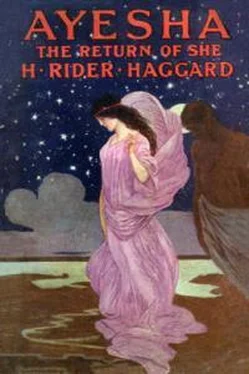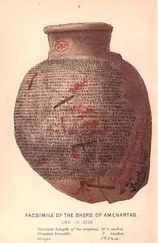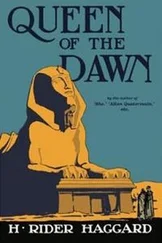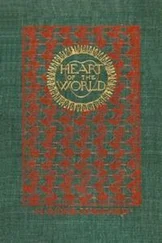It appeared, it vanished, and one by one the long minutes crept away until the first spear of dawn lit upon the point of rock.
Lo! it was empty, utterly empty and lonesome. Gone was the corpse of Leo, and gone too was Ayesha the imperial, the divine.
Whither had she gone? I know not. But this I know, that as the light returned and the broad sheet of flame flared out to meet it, I seemed to see two glorious shapes sweeping upward on its bosom, and the faces that they wore were those of Leo and of Ayesha.
Often and often during the weary months that followed, whilst I wandered through the temple or amid the winter snows upon the Mountain side, did I seek to solve this question—Whither had She gone? I asked it of my heart; I asked it of the skies; I asked it of the spirit of Leo which often was so near to me.
But no sure answer ever came, nor will I hazard one. As mystery wrapped Ayesha's origin and lives—for the truth of these things I never learned—so did mystery wrap her deaths, or rather her departings, for I cannot think her dead. Surely she still is, if not on earth, then in some other sphere?
So I believe; and when my own hour comes, and it draws near swiftly, I shall know whether I believe in vain, or whether she will appear to be my guide as, with her last words, she swore that she would do. Then, too, I shall learn what she was about to reveal to Leo when he died, the purposes of their being and of their love.
So I can wait in patience who must not wait for long, though my heart is broken and I am desolate.
Oros and all the priests were very good to me. Indeed, even had it been their wish, they would have feared to be otherwise, who remembered and were sure that in some time to come they must render an account of this matter to their dread queen. By way of return, I helped them as I was best able to draw up a scheme for the government of the conquered country of Kaloon, and with my advice upon many other questions.
And so at length the long months wore away, till at the approach of summer the snows melted. Then I said that I must be gone. They gave me of their treasures in precious stones, lest I should need money for my faring, since the gold of which I had such plenty was too heavy to be carried by one man alone. They led me across the plains of Kaloon, where now the husbandmen, those that were left of them, ploughed the land and scattered seed, and so on to its city. But amidst those blackened ruins over which Atene's palace still frowned unharmed, I would not enter, for to me it was, and always must remain, a home of death. So I camped outside the walls by the river just where Leo and I had landed after that poor mad Khan set us free, or rather loosed us to be hunted by his death–hounds.
Next day we took boat and rowed up the river, past the place where we had seen Atene's cousin murdered, till we came to the Gate–house. Here once again I slept, or rather did not sleep.
On the following morning I went down into the ravine and found to my surprise that the rapid torrent—shallow enough now—had been roughly bridged, and that in preparation for my coming rude but sufficient ladders were built on the face of the opposing precipice. At the foot of these I bade farewell to Oros, who at our parting smiled benignantly as on the day we met.
"We have seen strange things together," I said to him, not knowing what else to say.
"Very strange," he answered.
"At least, friend Oros," I went on awkwardly enough, "events have shaped themselves to your advantage, for you inherit a royal mantle."
"I wrap myself in a mantle of borrowed royalty," he answered with precision, "of which doubtless one day I shall be stripped."
"You mean that the great Ayesha is not dead?"
"I mean that She never dies. She changes, that is all. As the wind blows now hence, now hither, so she comes and goes, and who can tell at what spot upon the earth, or beyond it, for a while that wind lies sleeping? But at sunset or at dawn, at noon or at midnight, it will begin to blow again, and then woe to those who stand across its path.
"Remember the dead heaped upon the plains of Kaloon. Remember the departing of the Shaman Simbri with his message and the words that she spoke then. Remember the passing of the Hesea from the Mountain point. Stranger from the West, surely as to–morrow's sun must rise, as she went, so she will return again, and in my borrowed garment I await her advent."
"I also await her advent," I answered, and thus we parted.
Accompanied by twenty picked men bearing provisions and arms, I climbed the ladders easily enough, and now that I had food and shelter, crossed the mountains without mishap. They even escorted me through the desert beyond, till one night we camped within sight of the gigantic Buddha that sits before the monastery, gazing eternally across the sands and snows.
When I awoke next morning the priests were gone. So I took up my pack and pursued my journey alone, and walking slowly came at sunset to the distant lamasery. At its door an ancient figure, wrapped in a tattered cloak, was sitting, engaged apparently in contemplation of the skies. It was our old friend Kou–en. Adjusting his horn spectacles on his nose he looked at me.
"I was awaiting you, brother of the Monastery called 'the World,'" he said in a voice, measured, very ineffectually, to conceal his evident delight. "Have you grown hungry there that you return to this poor place?"
"Aye, most excellent Kou–en," I answered, "hungry for rest."
"It shall be yours for all the days of this incarnation. But say, where is the other brother?"
"Dead," I answered.
"And therefore re–born elsewhere or perhaps, dreaming in Devachan for a while. Well, doubtless we shall meet him later on. Come, eat, and afterwards tell me your story."
So I ate, and that night I told him all. Kou–en listened with respectful attention, but the tale, strange as it might seem to most people, excited no particular wonder in his mind. Indeed, he explained it to me at such length by aid of some marvellous theory of re–incarnations, that at last I began to doze.
"At least," I said sleepily, "it would seem that we are all winning merit on the Everlasting Plane," for I thought that favourite catchword would please him.
"Yes, brother of the Monastery called the World," Kou–en answered in a severe voice, "doubtless you are all winning merit, but, if I may venture to say so, you are winning it very slowly, especially the woman—or the sorceress—or the mighty evil spirit—whose names I understand you to tell me are She, Hes, and Ayesha upon earth and in Avitchi , Star–that–hath–Fallen―"
(Here Mr. Holly's manuscript ends, its outer sheets having been burnt when he threw it on to the fire at his house in Cumberland.)
As students of their lives and literature will be aware, it is common for Buddhist priests to state positively that they remember events which occurred during their previous incarnations.—ed.
Usually, as we learned afterwards, the river at this spot was quite shallow; only a foot or two in depth. It was the avalanche that by damming it with fallen heaps of snow had raised its level very many feet. Therefore, to this avalanche, which had threatened to destroy us, we in reality owed our lives, for had the stream stood only at its normal height we must have been dashed to pieces upon the stones. —L. H. H.
I found later that the Khania, Atene, was not Simbri's niece but his great–niece, on the mother's side.—L. H. H.
This, as I ascertained afterwards, was done by thrusting a broad stone of great thickness over the apertures through which the gas or fire rushed and thus cutting off the air. These stones were worked to and fro by means of pulleys connected with iron rods.—L. H. H.
Читать дальше
Конец ознакомительного отрывка
Купить книгу












